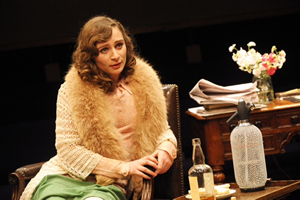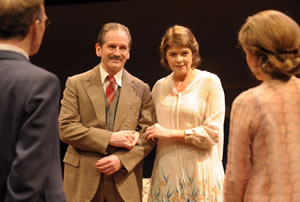The Man Who Pays the Piper – at The Orange Tree theatre, Richmond
1920s feminism has meaning today, writes theatre critic Liz Vercoe
What does happen to a family when the woman becomes the breadwinner, out all hours supporting partner and children? Can powerful, high-achieving women always find the romantic partners of their dreams? What do men want in a wife? These are questions still asked now, so it’s interesting to see them being aired, fresh as a daisy, back at the time of the Great War.
Written by GB Stern, GB for Gladys Bertha, later Bronwyn, in 1932, The Man Who Pays the Piper is set in 1913 and 1926 when Stern herself was 23 and 36. And it sifts entertainingly through the effects of the First World War on young women’s careers and aspirations and consequently those of the surviving menfolk.
 Daryll Fairley (played by Deirdre Mullins, pictured left) is the well-educated, creative and curious daughter of an Edwardian doctor and his warm and submissive wife Rosie (played with wide-eyed sweetness by former Casualty mainstay Julia Watson). One of six children, she has a responsible older bother and marriageable older sister, and a suitor, Rufus (Simon Harrison), who she is keeping at arm’s length until she fulfils her dream of becoming a dress designer. Over my dead body is her otherwise tolerant father’s view.
Daryll Fairley (played by Deirdre Mullins, pictured left) is the well-educated, creative and curious daughter of an Edwardian doctor and his warm and submissive wife Rosie (played with wide-eyed sweetness by former Casualty mainstay Julia Watson). One of six children, she has a responsible older bother and marriageable older sister, and a suitor, Rufus (Simon Harrison), who she is keeping at arm’s length until she fulfils her dream of becoming a dress designer. Over my dead body is her otherwise tolerant father’s view.
Which, sadly, is the case. The First World War wipes out father and oldest son, a crash in Russian bonds wipes out the family income, big sister marries, and our Daryll ends up the family breadwinner calling the tune around the house as she does at her successful fashion atelier. Here willowy actress Deirdre Mullins shows a captivating versatility taking her character from flighty, flirtatious teen to thirty-year-old businesswoman who is used to getting her own way. But with the added insight that, away from the eyes of her obsequious dependents, she sometimes thinks she would love to lay down the harness of responsibility, and worries that she is somehow less of a female because of her role.
 Yet what she simply can’t comprehend is her younger sister Fay’s determination to remain totally dependent, first on her big sister and one day on a husband. Emily Tucker (pictured right), who plays Fay, is a great “bright young thing” for whom carefree cocktails and her cosy room at home (and someone else to pay for them) are her heart’s desire. To Fay, the war defeminised women and scared her that the consequence was spinsterhood. And the two are really believable as loving yet mutually irritating sisters.
Yet what she simply can’t comprehend is her younger sister Fay’s determination to remain totally dependent, first on her big sister and one day on a husband. Emily Tucker (pictured right), who plays Fay, is a great “bright young thing” for whom carefree cocktails and her cosy room at home (and someone else to pay for them) are her heart’s desire. To Fay, the war defeminised women and scared her that the consequence was spinsterhood. And the two are really believable as loving yet mutually irritating sisters.
With as many shifts in the plot as there are twilight shifts of the on-set furniture (rather too many) at the tiny Orange Tree, the hot potato of “who has the money” is then handed to Rosie – who leaves lumps of it around: ”Mummy’s a real household communist,” says one of her children appreciatively – and then on to long-game-playing and loving Rufus who at last gets to marry Daryll. Simon Harrison successfully portrays the many possible sides to a man’s character, often seemingly at the flick of a switch.
 It’s a longish play at over 2 ½ hours but engrossing thanks to the totally convincing performances from the whole cast and its relevance today. Question after question is asked, about where lies fulfilment?, and, does holding the purse strings always have to be used as a weapon?
It’s a longish play at over 2 ½ hours but engrossing thanks to the totally convincing performances from the whole cast and its relevance today. Question after question is asked, about where lies fulfilment?, and, does holding the purse strings always have to be used as a weapon?
Ultimately the play seems to be heading, via yet more self-discovery U turns, for a fantastical and inherently sickly happy ever after, but then, with one, psychologically astute and final line from Daryll, as directed by Helen Leblique, GB Stern Stuart Fox (Benedictus) and Rosie (Julia Watson) saves the day and creates a play for today.
Phew. Clever woman that Gladys.
The Man Who pays the Piper runs until 13 April
For tickets, call the Box Office on 020 8940 3633 or www.orangetreetheatre.co.uk
March 18, 2013
Related links
|